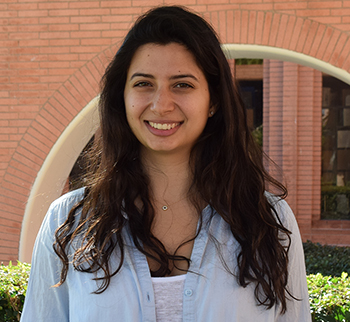
Maria Lattouf Abou Atmi
In the field of genocide studies and human rights, storytelling is the most impactful way to give information weight. And the first step to doing justice to the stories and the survivors who provide their testimonies is ensuring they’re translated accurately and with context.
This is one of master’s student Maria Lattouf Abou Atmi’s jobs. A translator and indexer for USC Shoah Foundation’s collections department, Maria chose to do her graduate studies in public diplomacy at USC in part because of the work she saw USC Shoah Foundation doing in preserving the stories of survivors in the Institute’s Visual History Archive.
“I saw the website and I saw all the work they had done and had been doing and it really appealed to me,” Maria said. “I think it’s important for history to be remembered – for people, specifically. It’s very easy to gloss over the numbers and say ‘this many people died in the Holocaust, this many people died in Rwanda,’ but it takes a different toll on a person when it’s a human telling their story. When there’s a face you can associate with it. When there’s a life.”
When she initially joined the Institute, Maria straddled two departments – executive and collections. She worked on personal branding projects for Stephen Smith and on additional projects wherever needed. But she came into her element working in collections under Armenian Genocide Collection Project Specialist Manuk Avedikyan, helping translate the final 18 testimonies in the Armenian Genocide Collection in a new way.
“It was really cool how we did it, actually,” Maria said. “The remaining interviews were in French, Arabic and Spanish, which are all languages I speak. I would listen to [the interviews] for about a minute and then we’d pause it and I’d relay to Manuk what had been said. He’d just use the keywords and fill in the blanks.”
In her time translating, Maria has realized two very particular challenges – one, that you can’t be fluent in every language you speak; and two, that it’s hard to do justice to a testimony when you don’t speak a language fluently.
“It turns out my Spanish was much better than I expected,” Maria said. “But my Arabic, for example…”
Maria is from Lebanon, and so speaks Lebanese Arabic. Although, because of the Syrian refugee crisis and the next-to-million refugees fleeing to Lebanon, she’s become more familiar with Syrian Arabic – the language of many of the Armenian Genocide testimonies – she still doesn’t have a comprehensive grasp of the language.
“I wasn’t familiar with it enough to know every single word,” Maria said. “So there was a lot of researching, looking stuff up that I wasn’t sure about, asking other people like my mom; whereas in Spanish, I understood every single word without a problem.”
But sometimes having to do outside research improved the already-existing translations Maria saw. In one, a Rwandan word she vaguely recognized was translated as “attack,” but after looking back over previous research and corroborating with a language expert, Maria identified it as the word for a particular kind of attack group, slightly changing the meaning of the testimony. She’d noticed not out of fluency, but out of reference to the word popping up in previous research.
After working in translations, Maria started on an indexing project with Crispin Brooks, curator of the Visual History Archive. She didn’t work on the indexing itself – the assigning of keywords to minutes of testimony so researchers can track what’s discussed, where – but on defining indexing terms.
“I worked mainly on people,” Maria said. “Figures in the Rwandan Genocide who were either ringleaders in the Interahamwe [a Hutu paramilitary organization], or like the prime minister of Rwanda who was killed early on when the genocide broke out. Whoever needed to be defined, I would come up with definitions, find sources, cite them.”
Although the work she’s done with USC Shoah Foundation has been rewarding, Maria hopes to enhance her experience and spur more direct action with her research and translations. As a public diplomacy major in the Annenberg School for Communications and Journalism, she hopes to work in human rights and storytelling.
“USC Shoah Foundation manages to do both very nicely,” Maria said. “I would love to stay on here for a while and keep doing the work I’m doing and maybe see more of a direct impact. Academics and research is fascinating and important and worthwhile but it’s not always the most rewarding endeavor. You sit there and you do all of this work and you don’t always see where it can help.”
Still, Maria has seen what kind of an impact the stories of survivors can make firsthand, and understands the responsibility of bringing those stories to the forefront of conversations about human rights and genocide and bigotry.
“[Each testimony I watched, personally] had a different impact,” Maria said. “There was one in particular that broke my heart. He was a special man. He had so much to tell and had all these souvenirs and all these stories and he was so brace. And just seeing the amount of bravery it takes to tell your story...Millions of people have the same or some version of this story, just just seeing how much courage it takes to tell one story and the responsibility we have to preserve it, to share it, to make sure this doesn’t happen again.”